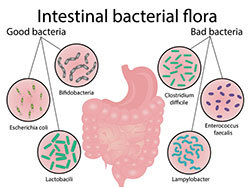
CLOSTRIDIUM DIFFICILE C-DIFF OR INFECTIOUS DIARRHEA
What is C-Diff?
Clostridium difficile, also known as C-diff, is a bacterium that lives in the intestine. In a healthy gut, the bacteria are kept under control by other bacteria present. When C-diff grows out of control, the resulting infection releases toxins and causes:
- Watery diarrhea
- Bloody diarrhea
- Cramping
- Nausea
- Loss of appetite
- Fever
- Abdominal pain
How to Prevent C-Diff?
Use antibiotics only as prescribed.
Spores can live outside the body for an extended period of time. They can exist on handles, bed rails, sheets, and towels for up to 7 months.
Therefore:
- During hospital stays, wash hands regularly with soap and water and see that visitors and healthcare providers wash their hands as well. Speak to hospital staff to fully understand their C-diff control methods, and follow instructions.
- At home keep bathroom fixtures clean, change linens frequently, and use separate hand towels. Bleach is proven to kill C-diff on hard surfaces.
It is rare for healthy visitors or caretakers to get C-diff.
Treatment
There are antibiotics that can be used to treat C-diff. Follow your doctor’s instructions carefully and use proper handwashing and cleanliness guidelines. Report additional symptoms to your doctor.
In some cases, in order to restore balance to the intestine, healthy fecal bacteria may be transplanted directly into the bowel.
If symptoms return, contact your physician.
Risk Factors:
- The use of multiple types of long-term antibiotics disrupts the balance of bacteria in the gut by killing good bacteria and allowing C-diff to proliferate.
- Chronic conditions such as IBD
- Hospitalization
- Living in a long-term care facility
- Previous C-diff diagnosis
